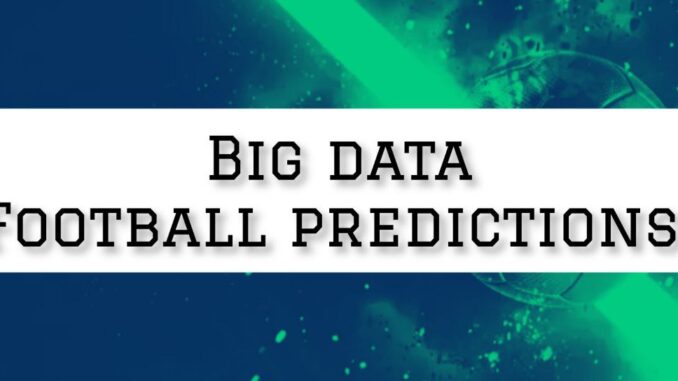
Within the high-stakes world of soccer predictions, everybody’s chasing the sting. However conventional strategies—these intestine emotions, group loyalty biases, or a observe file of wins and losses—simply don’t lower it anymore. In the event you’ve seen, the very best predictors within the sport right this moment have one large factor in frequent: they’re backed by large knowledge.
Image this: 1000’s of factors of knowledge collected per sport, each second analyzed, refined, and re-calibrated to make predictions so exact they really feel nearly like magic. Properly, it’s not magic; it’s arithmetic, algorithms, and an insane quantity of knowledge crunched sooner than we are able to think about.
Football fans and analysts can thank large knowledge for unlocking this precision. The place analysts as soon as may need relied on their “intestine intuition” a few participant’s efficiency primarily based on how they “appear” on the sphere, large knowledge sees the larger image—and by greater, I imply mind-mindbogglingly advanced.
It seems to be at the whole lot: the participant’s final ten sprints, the exact power exerted, how they deal with stress within the final quarter, and even how properly they get better from setbacks. Each dash, each move, each second turns into a possible goldmine of perception. And it’s not simply participant stats. Large knowledge will get into sport dynamics, like how sure climate patterns have an effect on the ball on a moist area or the best way sure groups modify to hostile crowds. It’s an evaluation on steroids, far past what the human eye can seize.
In the event you’re following the profession of any star participant, you’ll discover they’re more and more analyzed in microscopic element, right down to the angle of their toes whereas dribbling or the timing of every breath on the sphere. Information scientists are utilizing this sort of granular element to see patterns we wouldn’t in any other case see.
Take, for instance, the “anticipated targets” (xG) metric. 5 years in the past, few followers would have guessed that this single stat would rework soccer. However xG, which calculates the chance of a shot leading to a purpose, is all large knowledge. It’s a measure primarily based on 1000’s of shot information, situational particulars, and participant positioning.
Immediately, it’s not nearly whether or not Participant X scores however about how typically they’re anticipated to attain in each place on the pitch. If Participant X often outperforms their xG, you recognize they’re a real finisher, not simply fortunate.
Past enhancing predictions for a single sport, large knowledge additionally opens the door to forecasting a participant’s season-long, and even career-long, efficiency. Ever questioned why some golf equipment are keen to fork out thousands and thousands for a comparatively unknown participant? Large knowledge may give managers insights into participant compatibility with a group’s fashion, adaptability, and resilience—all earlier than a participant even units foot on the brand new turf. It’s like scouting sooner or later.
Some groups, like Liverpool, have turn into recognized for his or her data-driven methods, turning uncooked expertise and good recruitment into championship-winning choices. The key? Information has laid out the whole lot they should learn about a participant’s tendencies, how typically they’ll discover themselves in the suitable place on the proper time, or how they’ll handle in opposition to powerful defenses.
And let’s discuss betting—a aspect of the sport typically fraught with emotional predictions. Gamblers with entry to the suitable knowledge can weigh group power, damage information, journey influence, climate circumstances, and rather more. In different phrases, their guesses aren’t guesses anymore—they’re data-backed predictions.
These bettors aren’t seeking to be followers however to be realists, and knowledge helps them go away emotion out of the equation. If Crew A has a 5% higher likelihood of profitable primarily based on an mixture of 300 earlier video games in comparable circumstances, they’ll wager on that chilly, laborious actuality reasonably than private bias.
With synthetic intelligence and machine studying, large knowledge isn’t simply amassing info; it’s studying from it. AI algorithms in soccer predictions take historic match knowledge, layer it with present developments, and regularly self-optimize to get even higher. Think about a pc system watching the identical play unfold a thousand instances to be taught precisely how gamers reply.
Because the algorithm processes extra knowledge, it turns into much less more likely to get thrown by random anomalies and might make extra accurate predictions. We’re speaking about sample recognition at a scale and pace people simply can’t match, making even minor video games have predictive analytics to rival high-stakes matches.
The influence of massive knowledge on predictions can be affecting how groups play. Some managers use it to strategically relaxation gamers, handle accidents, or optimize formations. That’s the place it’s now not nearly forecasting however actively influencing outcomes, driving higher choices for golf equipment, gamers, and managers alike. Information affords insights that translate into smarter, safer, and extra strategic choices on the pitch.
Individuals who overlook large knowledge in soccer predictions are beginning to really feel like they’re nonetheless enjoying with paper playbooks in a digital world. In right this moment’s sport, large knowledge is now not only a technique; it’s a necessity. And with the extent of precision and accuracy it brings, soccer is rarely going again to the guesswork days.
We’re within the age the place knowledge, not instinct, is king on the sphere and within the stats—and for those who’re on the data-backed aspect of issues, each prediction simply would possibly begin to really feel like a positive factor.
